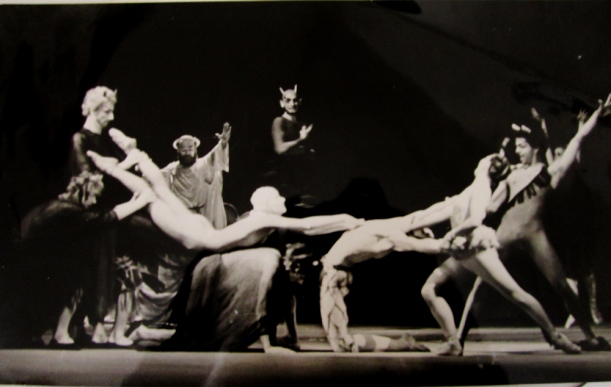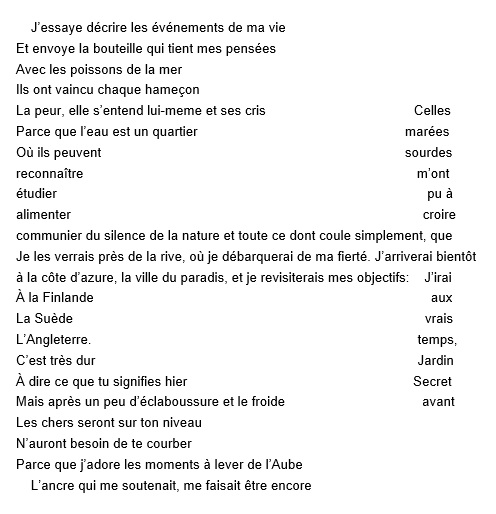Classical Ballet: An Athlete’s Realm or an Artist’s?

The essence of all art is to have pleasure in giving pleasure. –Mikhail Baryshnikov, Former principal dancer with the Kirov Ballet and New York City Ballet
It may please us; it may disgust us; it may move us to tears, or invoke our stifled laughter; walk down any street and you may well find it in a beautifully designed church or in the piercing eyes of a gilded lion door knocker; pass through any gallery and youmay stumble upon it in the troubled look of Frida Kahlo‘s self-portraits or one ofRenoir‘s absent-minded women lost in the idealism of provincialFrance; flick through Tolstoy‘s tragedies and you may utter it from your lips; wander through any shop and you may hear it echoing from the radio; but only when you step on stage to enact Le Corsaire orThe Dying Swan may you feel it in your flesh, may you truly become…
View original post 1,064 more words
“Nothing great in the world has ever been accomplished without passion.”
-Georg Wilhelm Friedrich Hegel
Innate Ideas
Okay, so I haven’t posted anything exactly philosophy-related in several weeks. So in order not to disappoint and stay true to the bio of the guy who set up this blog, I thought it would be fun to revisit some John Locke! He is most known for, in An Essay Concerning Human Understanding, his treatment of innate ideas. This concept of innate ideas was especially important to those who took up the position that there are foundational truths in our network of knowledge, which are essentially given to us at birth, which we use to further reason out and understand all of the things which we perceive in the world. It doesn’t take any sort of previous experience with the associated concepts or phenomena to come to a knowledge of these truths. Locke wants to reject these kinds of claims outright for many different reasons, but I will take a closer look at one of his more interesting objections in what follows.
To be as clear possible, it’s always a good idea to start with definitions. Here is Locke’s for innate ideas: “some primary notions, koinai ennoiai, characters, as it were stamped upon the mind of man; which the soul receives in its very first being, and brings into the world with it.” As one of the central figures in empiricism – or the idea that sensory experience is to be the main source of human knowledge – Locke is concerned with how we can explain the acquisition of knowledge in terms of impressions or imprints which we receive from perceiving objects in the world. Innate ideas are one of the first challenges which Locke seeks to overcome in developing his philosophy in the Essay. They are problematic in that it would seem that the foundational truths which we are given are outside of our capacity to know through perception, in virtue of us already being given them.
Locke finds cause for concern in all of this talk and goes on the defensive in arguing against innate ideas. He puts an emphasis on the faculty of reason, saying that it is this which is first required in order to recognize and assent to any truth that one can conceive of. His examples are a couple of the logical absolutes: an object, a, is what it is (a=a) and the same object cannot be both what it is and not what it is (a =/= b & ~b). He argues that there is no denying, upon discovery via reasoning, the truth of both of these two claims. But this is exactly the point – that it requires one to first reflect, and in so doing it is posing a threat to the notion of innate ideas. Locke more or less argues that something which is innately imprinted on the understanding need not be discovered, because it should be a truth which the subject is already actively conscious of, if it is to be considered innate. It needs to meet this condition if the truth is considered to be an impression naturally (innately) made on the understanding. Otherwise, the impression is without any substance and cannot be said to have made any real imprint. Locke draws a further distinction, stating that if we are restricting our focus to just the capacity for having knowledge – as it is fleshed out through the application/discovery of reasoning – this would still be insufficient for an innate idea, because, then, “all the truths a man ever comes to know will, by this account, be every one of them innate.” He thinks the actual innate ideas, if they exist, are the ones which deserve proper philosophical inquiry and this former line of reasoning only amounts to an “improper way of speaking.” It distracts us from the main question at hand.
He justifies all of this further by making counterexamples, which are a child and an idiot. Both of these subjects have rationality, to some degree, even in its developmental or affected stages, and so each can use one’s mind to make inferences, deduce further pieces of information from a set of given facts. But there will always be a subset in any given population, he argues, that will not be conscious and/or assent to the truth of either of the two claims above. There are two points here: One, of there not being universal assent, and two, a reliance upon others to help them along in learning the relevant pieces of information (names, concepts) in order for them to understand the truths for themselves. As far as the former point, Locke believes that an innate idea must be universally imprinted on man’s understanding for it to be truly innate. But, as I’ve said before, there are always outliers, people who simply don’t readily know or understand what seem to everyone else to be elementary truths. Hence, the child or the idiot just doesn’t have ‘it’ in them, in this case, to know that a red light means stop when they cruise on by; that being, the innate idea. But also, there is a stumbling block lodged up within someone when they just can’t be taught something. It’s hard to think about, but we can intuitively agree in saying that some things will just never get through to someone, despite our best efforts and careful presentation of the facts. Locke would suggest that if it were really innately imprinted on their soul, then one wouldn’t need assistance to discover the truth for him/herself. All of these points are ones which he thinks stand as evidence against the claim that innate ideas exist.
My take on Locke’s argument is that it is cleverly constructed, and that there are several good points made, but unable to dismiss the position completely. The thought here is that there are certain dispositions which we all have which often subconsciously get expressed in our actions. To be sure, these are altogether separate from the capacities which Locke argued against, in that a disposition would be defined as a product of a thought which, while not necessarily deliberate, is drawn out from preexisting ideas and their associated desires. Even the newborn child, whose brain had not developed enough to qualify as rational, still somehow primitively knows that s/he desires the love and affection of his/her mother, despite not having a concrete thought in mind which reflects this. It somehow is “wired” to react in a favorable way when it experiences the love of its mother. So I think that although it might not necessarily be termed, in the strict sense which Locke offers us, an innate idea (as something derived purely through reason), I believe that there remains a comparable concept which we can use to describe our observable behavior. There is a psychological component to the question which is clearly pertinent, and it is always a learning experience if a question such as this is analyzed through the perspectives of various schools of thought.
I’m in agreement with Locke’s claim that we don’t always universally assent to intuitively true maxims. The problem here in not assenting, which would make us doubt the notion of an idea’s innateness, is appropriate to the question. What I mean is that we need to necessarily assent, or positively affirm, some idea – so as to make it our belief – for it to be actually present in our understanding, because part of what it means for such an idea to be understood, is that it needs to be a part of us; it needs to be positively taken up within our mind anytime it is recalled in our memory. In short, the idea must be believed. And beliefs, by traditional standards, necessarily are more than passive tendencies to agree or disagree with a claim if asked about it. They need to be unfettered in all of our daily dealings, being sparks of our own initiative. So with Locke’s suggestion, I can’t see any way around the point that innate ideas must be assented to, in order for them to be innate. The issue interestingly transitions into being one of personal identity more than anything, and I think that this is the foundation for the epistemology which Locke depends upon. It is an important question in any case, but here we cannot go any further in assessing the concept of innate ideas from Locke’s perspective, as a mind which takes in phenomena through impressions and sensations, because of the pattern by which our personal beliefs are formulated. I must say, his argument is surely sound in this regard.
So after all of this, I think that we’ve brought the subject of Locke’s Essay into the fray, thrown him into the crosshairs of the debate on innate ideas. I would argue in the end that while he may have certain dispositions based on our human nature, we should side with Locke insofar as to say that these are not innate to us until we have done some of the work and reasoned out the impressions which we receive to fashion a set of beliefs for ourselves. This is a bit of a tangent to the question of whether humans, from the outset, are imprinted with certain innate ideas. General speaking on the latter point, I believe that Locke was incorrect, and that we do have, in a very abstract sense, some very broad ideas about love, justice, beauty, etc. – because this is what it means to be human. Whether or not these principles are innate in us, or if it is societally/culturally inherited is what we may disagree on, but even so, there is value in having the discussion. I personally find it gratifying, and I hope to someday chip away at that tabula rasa enough to see the core of my beliefs etched in the model of truth as it really is, as it actually exists.
Acoustic 3
Watch: Improv Everywhere Crashes TED Conference
Expectations
Instead of waiting for there to be some idea for me to toil over, I think I’m going to write just to write. I think it’s always great just to see where you end up once you’ve started. As far as arguments go, this is especially true, seeing how that a lot of times we have a preconceived idea of where we’d like our argument to conclude, before realizing in the end when all is said and done that the conclusion is nothing like we thought it’d be like. I often find that there’s something unpredictable in it all, and even though that might keep the logic from carrying out when we want it to, I think it’s a necessary step in better learning about the ideas that we think we know about.
I’m no longer a hard-nosed skeptic, really. That may or may not be good, but there’s just something invigorating in just going where the wind takes you and not getting ensnared in the details. I like having the opportunity to actually breathe and go about my day, doing the best I can not to worry about things that don’t matter. It’s not to say that things can’t be treated seriously, but it’s about finding a middle ground where you can be more or less comfortable, while not being facetious. I think this is the hardest part about it. Temperance is a virtue that not many people actually possess. Although I’d like to behave in a way that everyone will not be put off by, it doesn’t always work out. Some things you can tone down, build up if need-be, but I always want to think that there’s just something about people that just cannot and shouldn’t be changed for anybody. In some cases, we just are what we are, and there’s no point in trying anything differently to re-think and unfix our personalities.
Eradicating stigmas is always a tough issue, though. I don’t know if there’s such a thing as an undesirable set of sensibilities, but the combination of certain characters and events in one’s life can make for something like this. People look down upon people who have above-average tendencies to be sensitive, or do empathetic acts for others, for example. Of course no one wants to be a pushover, but the stigma comes up when people misunderstand one’s intentions. It’s not always a matter of pleasing other people when people go out of their way to help, it’s just their nature. There’s no use in fighting against yourself just to try and make yourself look good.
There’s a component of culture integral to the following question: When people act a certain way which is visibly outside of established social norms, how is their behavior analyzed to begin with? What I mean is that one would think there needs to be a fair measuring stick to make for a universally applicable description of what is expected in social situations, and in most cases there is. It’s given to us by our intuitions. But the problem arises when different cultures disagree on some of the smaller things, such as what is an acceptable way to receive favor, do good; when and how to properly give/take. I think there’s a useful conversation to be had here, and I wish different groups of people with different cultural beliefs would end their silent ongoing debate and just learn to understand each other’s differences.
I’ve been recently having this experience as a guy who’s just been recently relocated to a very mixed ethnic demographic. I am having a major culture-shock, now that I think about it, as I am working in an area which boasts 40% hispanic/latino. But it’s only shocking in that my behavior is not readily understood and/or appreciated when I try to be courteous and engaging in making friendly conversation. It’s unfortunate, but I often feel like I’m getting a load of sultry stares whenever I go out to the local laundromat, for example, where there is usually no other white person inside but me. I want to bridge the gap, learn from other people, actively shape people’s impression of me for the better, and to hear everyone’s story on their own terms. But this idea of social expectations that stem from various cultures makes this a complicated task – at least in the way that I see it when I stop to think about it.
But I’ve already decided that I won’t be doing that as much, really, so that’s probably as far as I’m going to go with that. Life needs to be lived while it’s still there for the taking. And every day is a new adventure to be had, so I’m not waiting.





